Abstract
To assess the relation of hyperaldosteronism and potassium depletion to the intensity of diuretic therapy we have measured plasma aldosterone by radioimmunoassay and total exchangeable potassium by radioisotope dilution in 24 patients when they were stable at the end of their preparation for cardiac operation. Some patients required intensive frusemide therapy to reach an optimal state for operation and many showed hyperaldosteronism. Plasma aldosterone was significantly related to daily dose of frusemide (r=0.77). Depletion of total exchangeable potassium expressed in terms of predicted weight was significantly related to plasma aldosterone (r= -0.64). The reduction in total exchangeable potassium is interpreted as chiefly related to loss of lean tissue mass from the wasting that leads to cardiac cachexia, but evidence is presented on the basis of measurements of extracellular fluid volume as sulphate space (20 patients) of entry of sodium into the cells which may indicate a true cellular potassium loss. Although plasma potassium is usually easily maintained with oral potassium supplements or aldosterone antagonists, we postulate that intensive diuretic therapy in severe heart disease may provoke hyperaldosteronism which accentuates potassium loss and may contribute to wasting and to intracellular potassium depletion in critical tissue, such as myocardium.
Full text
PDF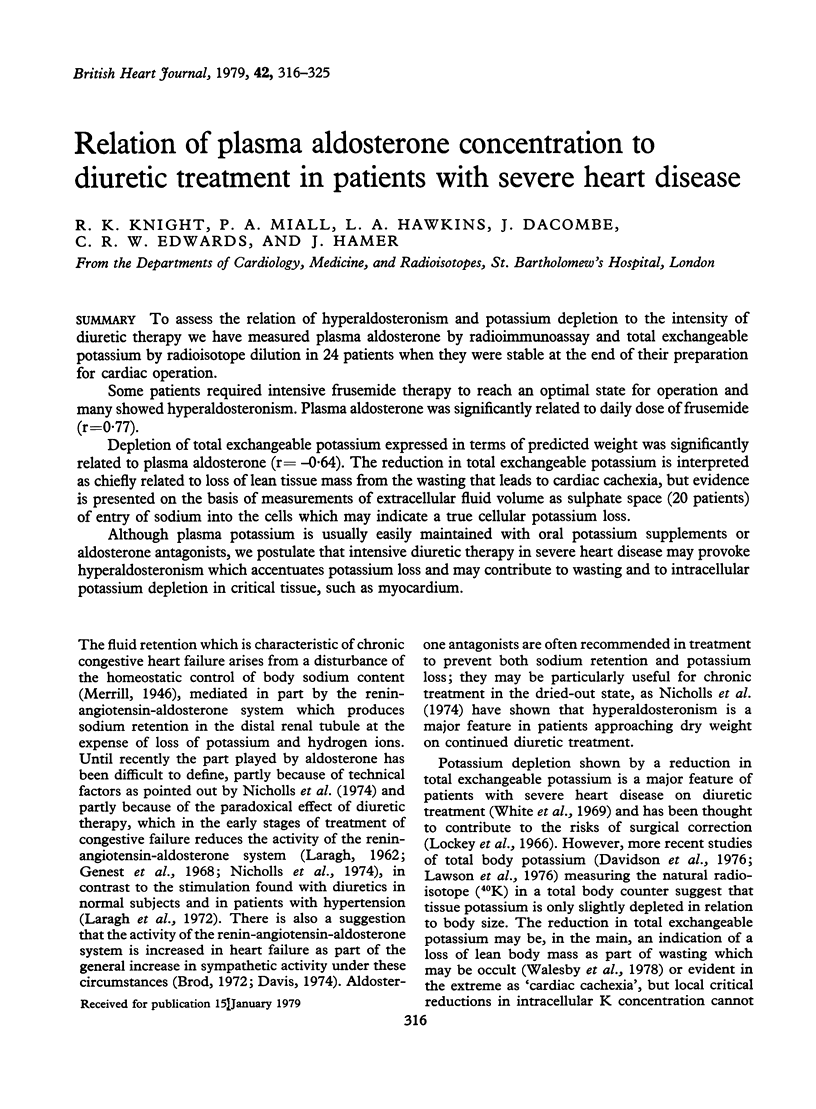
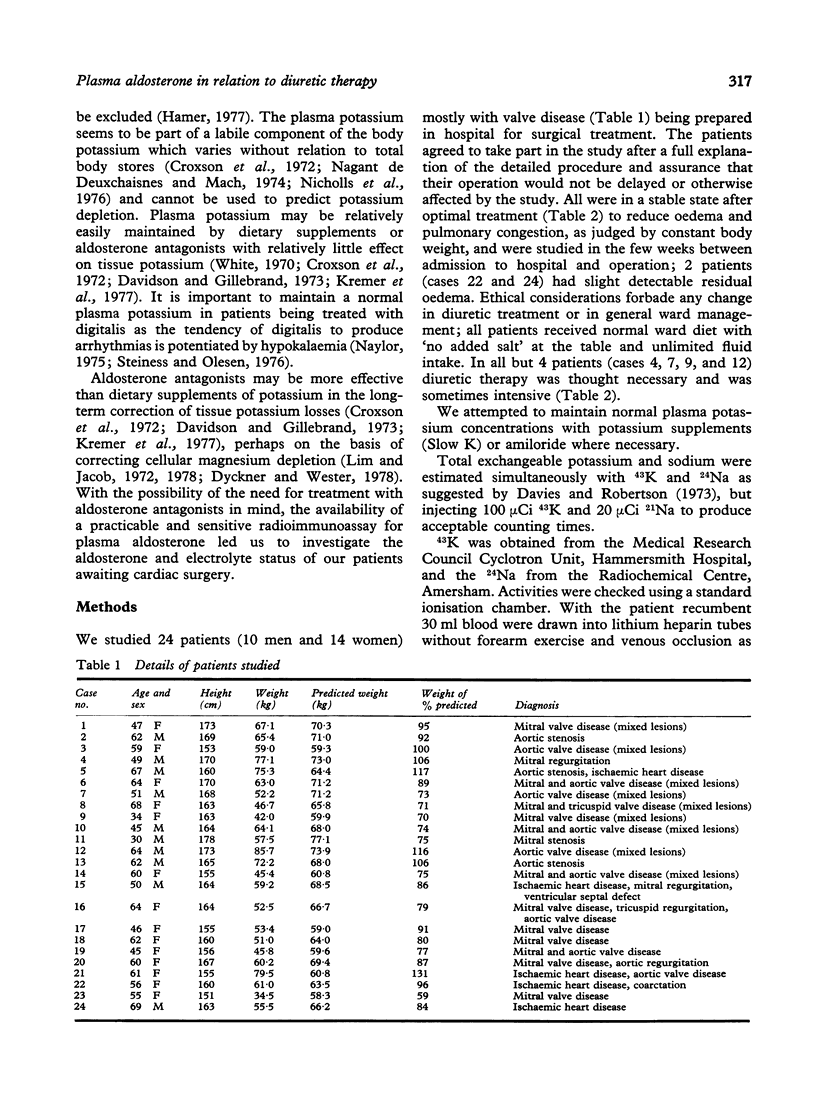
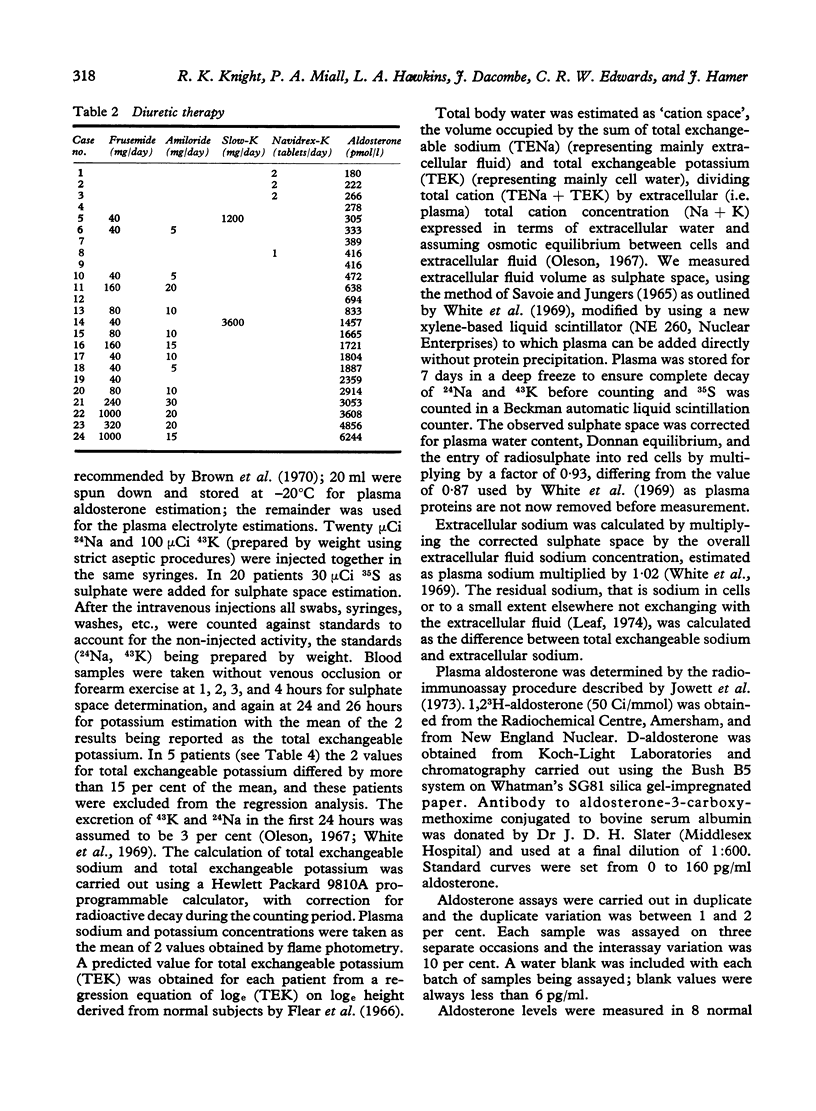
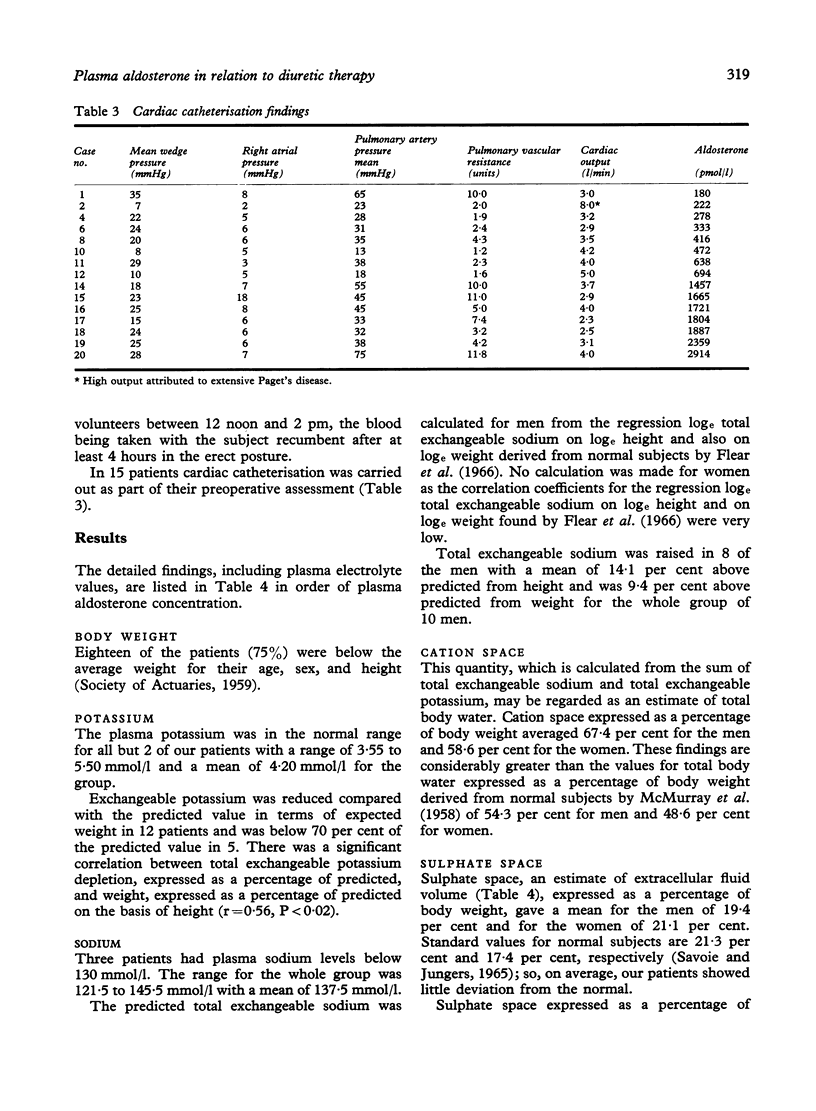
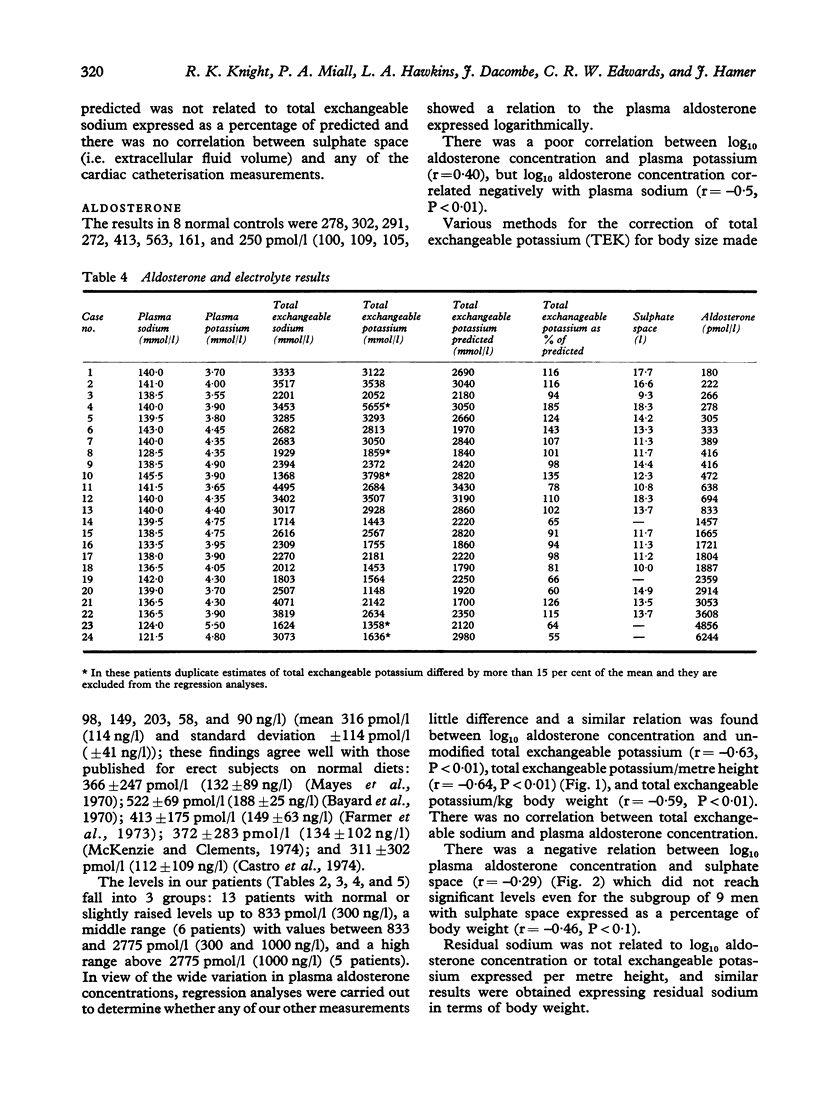
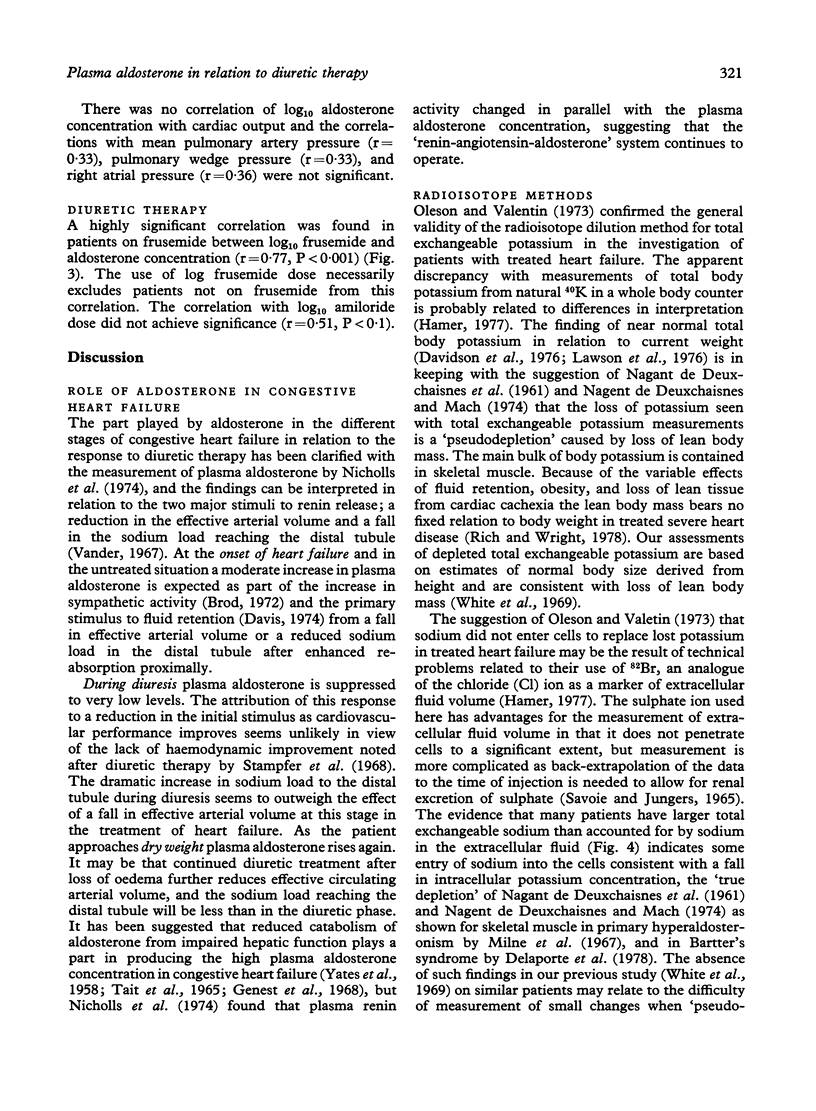
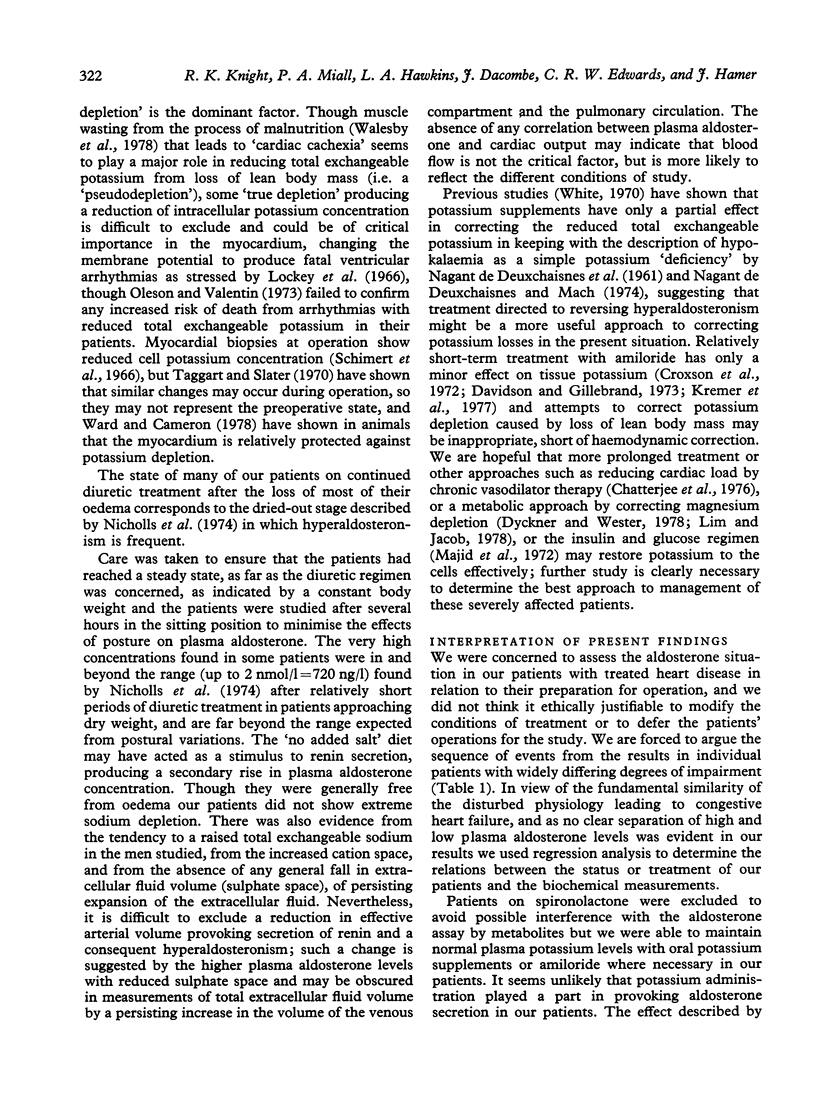
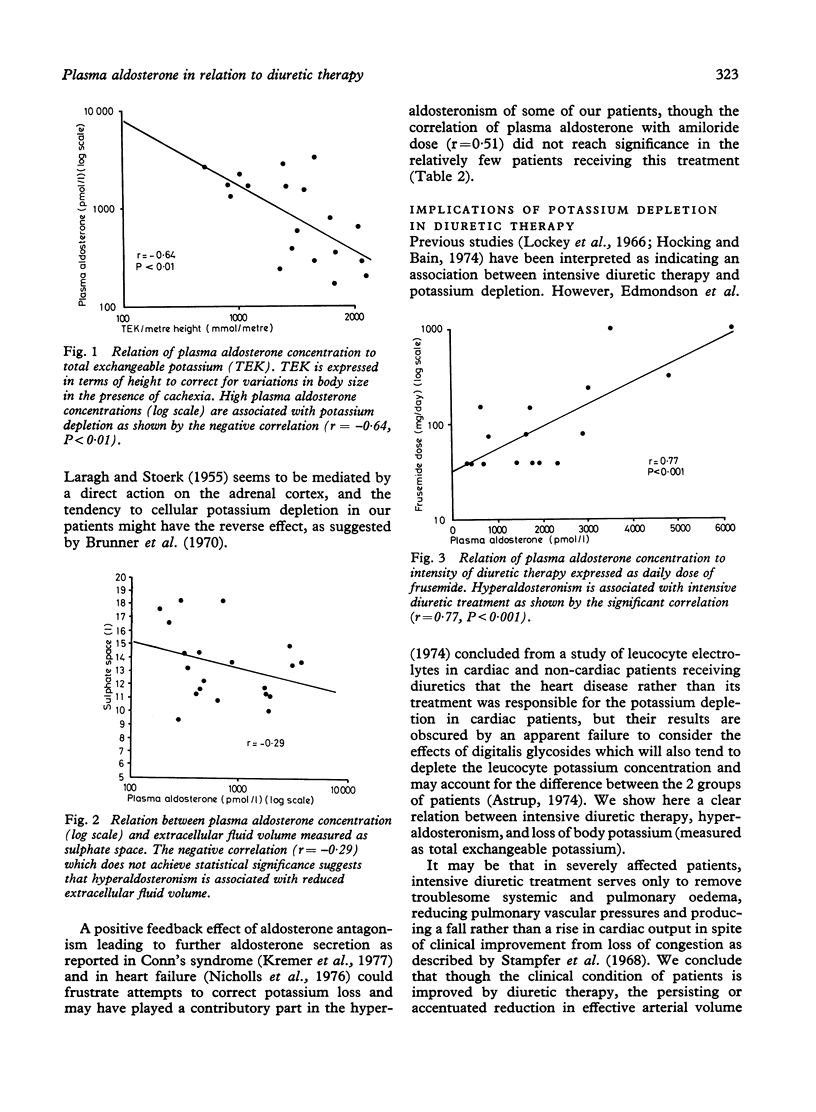
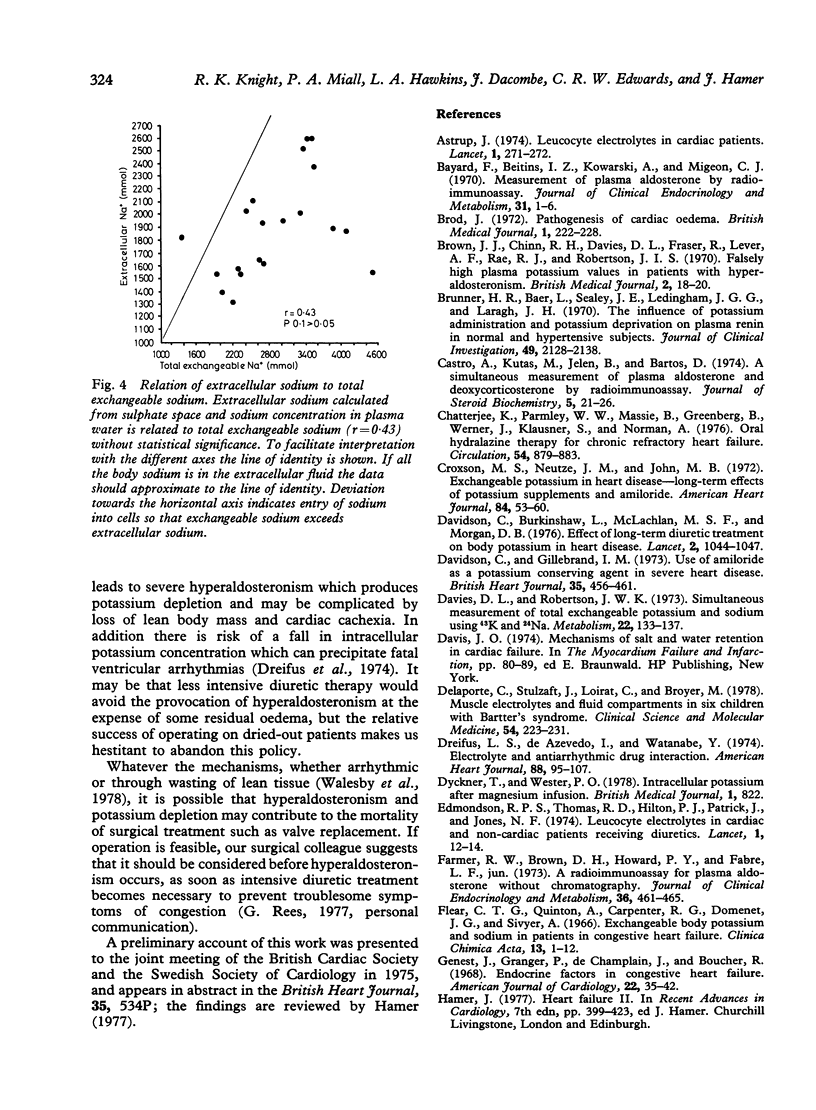
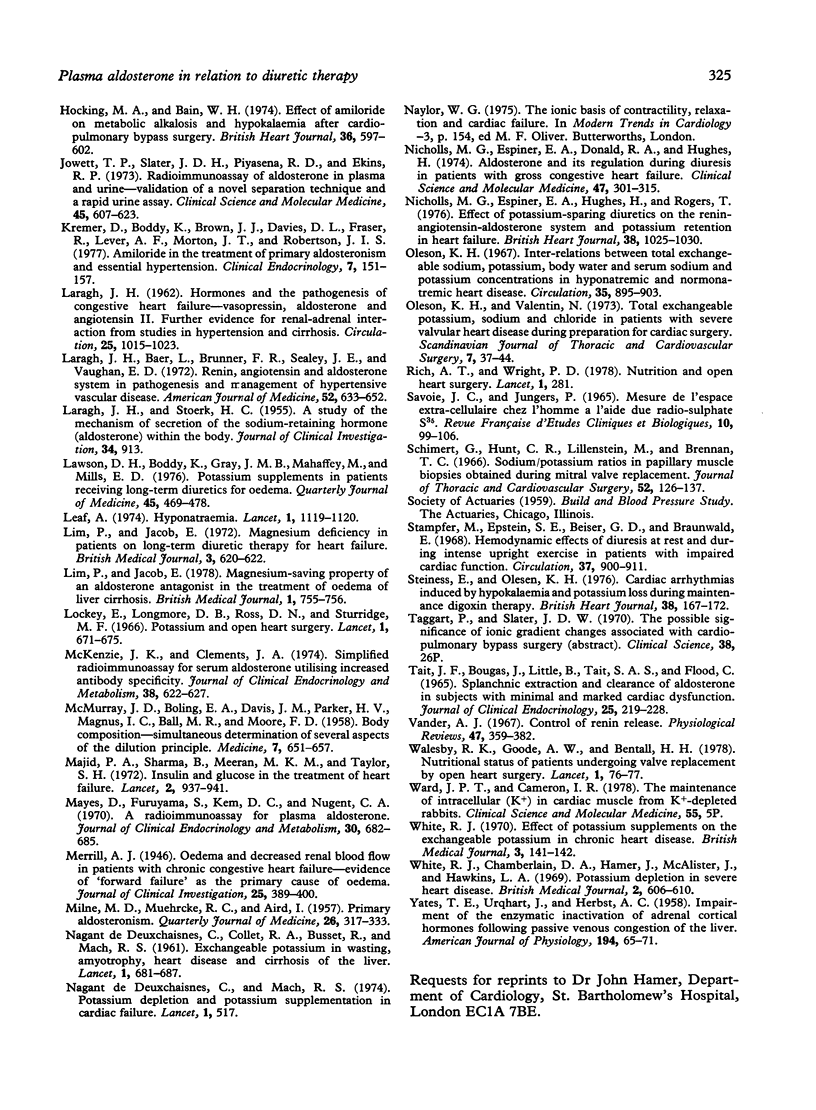
Selected References
These references are in PubMed. This may not be the complete list of references from this article.
- Bayard F., Beitins I. Z., Kowarski A., Migeon C. J. Measurement of plasma aldosterone by radioimmunoassay. J Clin Endocrinol Metab. 1970 Jul;31(1):1–6. doi: 10.1210/jcem-31-1-1. [DOI] [PubMed] [Google Scholar]
- Brod J. Pathogenesis of cardiac oedema. Br Med J. 1972 Jan 22;1(5794):222–228. doi: 10.1136/bmj.1.5794.222. [DOI] [PMC free article] [PubMed] [Google Scholar]
- Brown J. J., Chinn R. H., Davies D. L., Fraser R., Lever A. F., Rae R. J., Robertson J. I. Falsely high plasma potassium values in patients with hyperaldosteronism. Br Med J. 1970 Apr 4;2(5700):18–20. doi: 10.1136/bmj.2.5700.18. [DOI] [PMC free article] [PubMed] [Google Scholar]
- Brunner H. R., Baer L., Sealey J. E., Ledingham J. G., Laragh J. H. The influence of potassium administration and of potassium deprivation on plasma renin in normal and hypertensive subjects. J Clin Invest. 1970 Nov;49(11):2128–2138. doi: 10.1172/JCI106430. [DOI] [PMC free article] [PubMed] [Google Scholar]
- Castro A., Kutas M., Jelen B., Bartos D. A simultaneous measurement of plasma aldosterone and deoxycorticosterone by radioimmunoassay. J Steroid Biochem. 1974 Feb;5(1):21–26. doi: 10.1016/0022-4731(74)90023-5. [DOI] [PubMed] [Google Scholar]
- Chatterjee K., Parmley W. W., Massie B., Greenberg B., Werner J., Klausner S., Norman A. Oral hydralazine therapy for chronic refractory heart failure. Circulation. 1976 Dec;54(6):879–883. doi: 10.1161/01.cir.54.6.879. [DOI] [PubMed] [Google Scholar]
- Croxson M. S., Neutze J. M., John M. B. Exchangeable potassium in heart disease: long-term effects of potassium supplements and amiloride. Am Heart J. 1972 Jul;84(1):53–60. doi: 10.1016/0002-8703(72)90305-5. [DOI] [PubMed] [Google Scholar]
- Davidson C., Gillebrand I. M. Use of amiloride as a potassium conserving agent in severe cardiac disease. Br Heart J. 1973 Apr;35(4):456–461. doi: 10.1136/hrt.35.4.456. [DOI] [PMC free article] [PubMed] [Google Scholar]
- Davidson C., McLachlan M. S., Burkinshaw L., Morgan D. B. Effect of long-term diuretic treatment on body-potassium in heart-disease. Lancet. 1976 Nov 13;2(7994):1044–1047. doi: 10.1016/s0140-6736(76)90965-x. [DOI] [PubMed] [Google Scholar]
- Davies D. L., Robertson J. W. Simultaneous measurement of total exchangeable potassium and sodium using 43 K and 24 Na. Metabolism. 1973 Feb;22(2):133–137. doi: 10.1016/0026-0495(73)90263-1. [DOI] [PubMed] [Google Scholar]
- De Deuxchaisnes C. N., Mach R. S. Letter: Potassium depletion and potassium supplementation in cardiac failure. Lancet. 1974 Mar 23;1(7856):517–517. doi: 10.1016/s0140-6736(74)92832-3. [DOI] [PubMed] [Google Scholar]
- Delaporte C., Stulzaft J., Loirat C., Broyer M. Muscle electrolytes and fluid compartments in six children with Bartter's syndrome. Clin Sci Mol Med. 1978 Mar;54(3):223–231. doi: 10.1042/cs0540223. [DOI] [PubMed] [Google Scholar]
- Dreifus L. S., de Azevedo I. M., Watanabe Y. Review: Electrolyte and antiarrhythmic drug interaction. Am Heart J. 1974 Jul;88(1):95–107. doi: 10.1016/0002-8703(74)90355-x. [DOI] [PubMed] [Google Scholar]
- Dyckner T., Wester P. O. Intracellular potassium after magnesium infusion. Br Med J. 1978 Apr 1;1(6116):822–823. doi: 10.1136/bmj.1.6116.822-a. [DOI] [PMC free article] [PubMed] [Google Scholar]
- Edmondson R. P., Thomas R. D., Hilton P. J., Patrick J., Jones N. F. Leucocyte electrolytes in cardiac and non-cardiac patients receiving diuretics. Lancet. 1974 Jan 5;1(7845):12–14. doi: 10.1016/s0140-6736(74)93001-3. [DOI] [PubMed] [Google Scholar]
- Farmer R. W., Brown D. H., Howard P. Y., Fabre L. F., Jr A radioimmunoassay for plasma aldosterone without chromatography. J Clin Endocrinol Metab. 1973 Mar;36(3):460–465. doi: 10.1210/jcem-36-3-460. [DOI] [PubMed] [Google Scholar]
- Flear C. T., Quinton A., Carpenter R. G., Domenet J. G., Sivyer A. Exchangeable body potassium and sodium in patients in congestive heart failure. Clin Chim Acta. 1966 Jan;13(1):1–12. doi: 10.1016/0009-8981(66)90258-0. [DOI] [PubMed] [Google Scholar]
- Genest J., Granger P., De Champlain J., Boucher R. Endocrine factors in congestive heart failure. Am J Cardiol. 1968 Jul;22(1):35–42. doi: 10.1016/0002-9149(68)90244-0. [DOI] [PubMed] [Google Scholar]
- Hocking M. A., Bain W. H. Effect of amiloride on metabolic alkalosis and hypokalaemia after cardiopulmonary bypass surgery. Br Heart J. 1974 Jun;36(6):597–602. doi: 10.1136/hrt.36.6.597. [DOI] [PMC free article] [PubMed] [Google Scholar]
- Jowett T. P., Slater J. D., Piyasena R. D., Ekins R. P. Radioimmunoassay of aldosterone in plasma and urine: validation of a novel separation technique and a rapid urine assay. Clin Sci Mol Med. 1973 Nov;45(5):607–623. doi: 10.1042/cs0450607. [DOI] [PubMed] [Google Scholar]
- Kremer D., Boddy K., Brown J. J., Davies D. L., Fraser R., Lever A. F., Morton J. J., Robertson J. I. Amiloride in the treatment of primary hyperaldosteronism and essential hypertension. Clin Endocrinol (Oxf) 1977 Aug;7(2):151–157. doi: 10.1111/j.1365-2265.1977.tb01307.x. [DOI] [PubMed] [Google Scholar]
- LARAGH J. H. Hormones and the pathogenesis of congestive heart failure: vasopressin, aldosterone, and angiotensin II. Further evidence for renal-adrenal interaction from studies in hypertension and in cirrhosis. Circulation. 1962 Jun;25:1015–1023. doi: 10.1161/01.cir.25.6.1015. [DOI] [PubMed] [Google Scholar]
- Laragh J. H., Baer L., Brunner H. R., Buhler F. R., Sealey J. E., Vaughan E. D., Jr Renin, angiotensin and aldosterone system in pathogenesis and management of hypertensive vascular disease. Am J Med. 1972 May;52(5):633–652. doi: 10.1016/0002-9343(72)90054-x. [DOI] [PubMed] [Google Scholar]
- Lawson D. H., Boddy K., Gray J. M., Mahaffey M., Mills E. Potassium supplements in patients receiving long-term diuretics for oedema. Q J Med. 1976 Jul;45(179):469–478. [PubMed] [Google Scholar]
- Leaf A. Letter: Hyponatraemia. Lancet. 1974 Jun 1;1(7866):1119–1120. doi: 10.1016/s0140-6736(74)90608-4. [DOI] [PubMed] [Google Scholar]
- Lim P., Jacob E. Magnesium deficiency in patients on long-term diuretic therapy for heart failure. Br Med J. 1972 Sep 9;3(5827):620–622. doi: 10.1136/bmj.3.5827.620. [DOI] [PMC free article] [PubMed] [Google Scholar]
- Lim P., Jacob E. Magnesium-saving property of an aldosterone antagonist in the treatment of oedema of liver cirrhosis. Br Med J. 1978 Mar 25;1(6115):755–756. doi: 10.1136/bmj.1.6115.755. [DOI] [PMC free article] [PubMed] [Google Scholar]
- Lockey E., Ross D. N., Longmore D. B., Sturridge M. F. Potassium and open-heart surgery. Lancet. 1966 Mar 26;1(7439):671–675. doi: 10.1016/s0140-6736(66)91625-4. [DOI] [PubMed] [Google Scholar]
- MILNE M. D., MUEHRCKE R. C., AIRD I. Primary aldosteronism. Q J Med. 1957 Jul;26(103):317–333. [PubMed] [Google Scholar]
- Majid P. A., Sharma B., Meeran M. K., Taylor S. H. Insulin and glucose in the treatment of heart-failure. Lancet. 1972 Nov 4;2(7784):937–941. doi: 10.1016/s0140-6736(72)92468-3. [DOI] [PubMed] [Google Scholar]
- Mayes D., Furuyama S., Kem D. C., Nugent C. A. A radioimmunoassay for plasma aldosterone. J Clin Endocrinol Metab. 1970 May;30(5):682–685. doi: 10.1210/jcem-30-5-682. [DOI] [PubMed] [Google Scholar]
- McKenzie J. K., Clements J. A. Simplified radioimmunoassay for serum aldosterone utilizing increased antibody specificity. J Clin Endocrinol Metab. 1974 Apr;38(4):622–627. doi: 10.1210/jcem-38-4-622. [DOI] [PubMed] [Google Scholar]
- McMURREY J. D., BOLING E. A., DAVIS J. M., PARKER H. V., MAGNUS I. C., BALL M. R., MOORE F. D. Body composition: simultaneous determination of several aspects by the dilution principle. Metabolism. 1958 Sep;7(5):651–667. [PubMed] [Google Scholar]
- Merrill A. J. EDEMA AND DECREASED RENAL BLOOD FLOW IN PATIENTS WITH CHRONIC CONGESTIVE HEART FAILURE: EVIDENCE OF "FORWARD FAILURE" AS THE PRIMARY CAUSE OF EDEMA. J Clin Invest. 1946 May;25(3):389–400. doi: 10.1172/JCI101720. [DOI] [PMC free article] [PubMed] [Google Scholar]
- NAGANT DE DEUXCHAISNES C., COLLET R. A., BUSSET R., MACH R. S. Exchangeable potassium in wasting, amyotrophy, heart-disease, and cirrhosis of the liver. Lancet. 1961 Apr 1;1(7179):681–687. doi: 10.1016/s0140-6736(61)91719-6. [DOI] [PubMed] [Google Scholar]
- Nicholls M. G., Espiner E. A., Donald R. A., Hughes H. Aldosterone and its regulation during diuresis in patients with gross congestive heart failure. Clin Sci Mol Med. 1974 Oct;47(4):301–315. doi: 10.1042/cs0470301. [DOI] [PubMed] [Google Scholar]
- Nicholls M. G., Espiner E. A., Hughes H., Rogers T. Effect of potassium-sparing diuretics on the renin-angiotensin-aldosterone system and potassium retention in heart failure. Br Heart J. 1976 Oct;38(10):1025–1030. doi: 10.1136/hrt.38.10.1025. [DOI] [PMC free article] [PubMed] [Google Scholar]
- Olesen K. H. Interrelations between total exchangeable sodium, potassium, body water, and serum sodium and potassium concentrations in hyponatremic and normonatremic heart disease. Circulation. 1967 May;35(5):895–903. doi: 10.1161/01.cir.35.5.895. [DOI] [PubMed] [Google Scholar]
- Olesen K. H., Valentin N. Total exchangeable potassium, sodium and chloride in patients with severe valvular heart disease during preparation for cardiac surgery. Scand J Thorac Cardiovasc Surg. 1973;7(1):37–44. doi: 10.3109/14017437309139164. [DOI] [PubMed] [Google Scholar]
- Rich A. J., Wright P. D. Nutrition and open heart surgery. Lancet. 1978 Feb 4;1(8058):281–281. doi: 10.1016/s0140-6736(78)90534-2. [DOI] [PubMed] [Google Scholar]
- Schimert G., Hunt O. R., Lillenstein M., Brennan J. C. Sodium/potassium ratios in papillary muscle biopsies obtained during mitral valve replacement. J Thorac Cardiovasc Surg. 1966 Jul;52(1):126–137. [PubMed] [Google Scholar]
- Stampfer M., Epstein S. E., Beiser G. D., Braunwald E. Hemodynamic effects of diuresis at rest and during intense upright exercise in patients with impaired cardiac function. Circulation. 1968 Jun;37(6):900–911. doi: 10.1161/01.cir.37.6.900. [DOI] [PubMed] [Google Scholar]
- Steiness E., Olesen K. H. Cardiac arrhythmias induced by hypokalaemia and potassium loss during maintenance digoxin therapy. Br Heart J. 1976 Feb;38(2):167–172. doi: 10.1136/hrt.38.2.167. [DOI] [PMC free article] [PubMed] [Google Scholar]
- TAIT J. F., LITTLE B., TAIT S. A., FLOOD C., BOUGAS J. SPLANCHNIC EXTRACTION AND CLEARANCE OF ALDOSTERONE IN SUBJECTS WITH MINIMAL AND MARKED CARDIAC DYSFUNCTION. J Clin Endocrinol Metab. 1965 Feb;25:219–228. doi: 10.1210/jcem-25-2-219. [DOI] [PubMed] [Google Scholar]
- Taggart P., Slater J. D. The possible significance of ionic gradient changes associated with cardio-pulmonary bypass surgery. Clin Sci. 1970 Apr;38(4):26P–26P. doi: 10.1042/cs038026p. [DOI] [PubMed] [Google Scholar]
- Vander A. J. Control of renin release. Physiol Rev. 1967 Jul;47(3):359–382. doi: 10.1152/physrev.1967.47.3.359. [DOI] [PubMed] [Google Scholar]
- Walesby R. K., Goode A. W., Bentall H. H. Nutritional status of patients undergoing valve replacement by open heart surgery. Lancet. 1978 Jan 14;1(8055):76–77. doi: 10.1016/s0140-6736(78)90008-9. [DOI] [PubMed] [Google Scholar]
- White R. J., Chamberlain D. A., Hamer J., McAlister J., Hawkins L. A. Potassium depletion in severe heart disease. Br Med J. 1969 Jun 7;2(5657):606–610. doi: 10.1136/bmj.2.5657.606. [DOI] [PMC free article] [PubMed] [Google Scholar]
- White R. J. Effect of potassium supplements on the exchangeable potassium in chronic heart disease. Br Med J. 1970 Jul 18;3(5715):141–142. doi: 10.1136/bmj.3.5715.141. [DOI] [PMC free article] [PubMed] [Google Scholar]
- YATES F. E., URQUHART J., HERBST A. L. Impairment of the enzymatic inactivation of adrenal cortical hormones following passive venous congestion of the liver. Am J Physiol. 1958 Jul;194(1):65–71. doi: 10.1152/ajplegacy.1958.194.1.65. [DOI] [PubMed] [Google Scholar]


